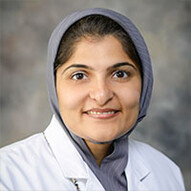Pediatric hypothyroidism
Your thyroid gland is a butterfly-shaped gland located at the base of your neck, just above your collarbone. It is one of your endocrine glands, which means its job is to produce hormones. Thyroid hormones control your body’s metabolism, including how fast you burn calories and how fast your heart beats. They also help regulate your body’s calcium levels.
What is pediatric hypothyroidism?
Hypothyroidism (hy·po·thy·roid·ism) is a condition in which the thyroid gland is underactive and produces an insufficient amount of thyroid hormones. It is the most common thyroid disorder affecting children.
Risk factors
Children who are born to mothers who are being treated for a thyroid disorder are at risk for hypothyroidism.
Other risk factors may include:
Family history of thyroid disease
Previous radiation exposure to the chest or neck
Surgery to remove the thyroid gland
Treatment for hyperthyroidism
What are the different types of pediatric hypothyroidism?
Congenital hypothyroidism is present at birth. This occurs when the thyroid gland doesn’t develop or function while the baby is still in the womb. Because it may affect one baby out of every 3,000, it is something all babies are checked for during routine newborn screening.
Acquired hypothyroidism develops after birth. This condition often shows up in late childhood or in the teens. It is thought to be a result of the body mistaking the thyroid for an invader. The immune system then attacks the gland, as it would anything that is seen as a threat.
What are the signs and symptoms of pediatric hypothyroidism?
The symptoms of hypothyroidism in children are different than those in adults. Symptoms may vary from child to child, and some children may have no symptoms at all. Infants with more severe forms often have a specific appearance that includes a dull look, puffy face and a thick protruding tongue.
Congenital hypothyroidism symptoms may include:
Choking episodes
Dry, brittle hair
Lack of muscle tone
Low hairline
Poor feeding
Short height
Sleepiness
Acquired hypothyroidism symptoms may include:
An inability to exercise for the amount of time or level that they should be able to given their age (exercise intolerance)
Droopy eyelids
Dry and thickened skin
Dull expression on face
Eyebrows that thin or fall out
Fatigue
Increased menstrual flow or cramping after puberty
Muscle cramping
Puffiness or swelling around the face
Sensitivity to cold
Slow pulse
Slow speech
Slowed reaction times
Swelling at the front of neck due to an enlarged thyroid gland or goiter
Thinning, coarse, dry hair
Voice that is always hoarse
Weight gain that is not related to eating more
How is pediatric hypothyroidism diagnosed?
Congenital hypothyroidism - This is usually detected during the routine newborn screening.
Acquired hypothyroidism - Your child’s doctor will make a diagnosis based on a combination of patient history, physical exam and blood tests that measure thyroid hormone (T4) and thyroid-stimulating hormone (TSH) levels.
What are the causes of pediatric hypothyroidism?
The most common cause of hypothyroidism is an autoimmune disorder called Hashimoto’s thyroiditis, in which the body's immune system slowly destroys the thyroid gland. It may also be caused by overtreatment of hyperthyroidism.
How is pediatric hypothyroidism treated?
Medication
The treatment of choice for hypothyroidism is thyroid replacement therapy pills. Some children will need to take the medication for the rest of their lives, while others will outgrow the disorder, often by the age of 3. Regular monitoring of your child's thyroid hormone levels during the course of treatment is necessary in order to ensure appropriate treatment.
Hypothyroidism in the newborn, when left untreated, can lead to intellectual disability and profound developmental delays. Untreated hypothyroidism may also lead to anemia, low body temperature and heart failure.
Surgery
Surgery may be considered for children with hyperthyroidism who don’t respond to medication, have bad side effects or are allergic to it, or in cases where the gland has gotten too large. It also is used when cancer has been confirmed.
Pediatric hypothyroidism doctors and providers
 Perrin White, MDPediatric Endocrinologist
Perrin White, MDPediatric Endocrinologist Soumya Adhikari, MDPediatric Endocrinologist
Soumya Adhikari, MDPediatric Endocrinologist Abha Choudhary, MDPediatric Endocrinologist
Abha Choudhary, MDPediatric Endocrinologist Melissa Ham, MDPediatric Endocrinologist
Melissa Ham, MDPediatric Endocrinologist Huay-Lin Lo, MDPediatric Endocrinologist
Huay-Lin Lo, MDPediatric Endocrinologist Muniza Mogri, MDPediatric Endocrinologist
Muniza Mogri, MDPediatric Endocrinologist Nivedita Patni, MDPediatric Endocrinologist
Nivedita Patni, MDPediatric Endocrinologist Amanda Shaw, MDPediatric Endocrinologist
Amanda Shaw, MDPediatric Endocrinologist Ming Yang, MDPediatric Endocrinologist
Ming Yang, MDPediatric Endocrinologist Jimmy Penn, APRN, FNPNurse Practitioner - Endocrinology
Jimmy Penn, APRN, FNPNurse Practitioner - Endocrinology Bernice Samuel, APRN, FNPNurse Practitioner - Endocrinology
Bernice Samuel, APRN, FNPNurse Practitioner - Endocrinology